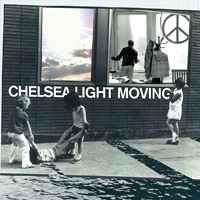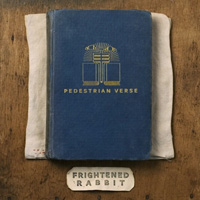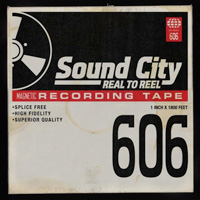Music Reviews, 04/2013
The Flaming Lips, The Terror
Local Natives, Hummingbird
Chelsea Light Moving, Chelsea Light Moving
Youth Lagoon, Wondrous Bughouse
Frightened Rabbit, Pedestrian Verse
Various Artists, Sound City: Real to Reel
The Flaming Lips | The Terror
Warner Bros.
by James Brubaker
 Despite their public image of being free-spirited, anything-goes hippies, The Flaming Lips have always had a bit of a dark streak running through their music. Of course, it’s easy to forget about that dark streak when The Lips’ cultivated image draws on dancing flowers during their live shows, and happy-go-lucky appearances in Super Bowl car commercials. Just beyond the constructed idea that The Flaming Lips are warmed over hippies preaching peace and love, however, lurks the weirder, darker truths that define their music’s unsettled psychadelia. Looking back to The Soft Bulletin, we can pinpoint “The Spiderbite Song,” and “Suddenly Everything has Changed” as moments of quirky, psych-pop spun out of dark truths and anxious realizations. In the first, one of the verses, the verse about the song’s titular bite, is about the time Steve Drozd almost had to have his arm amputated due to heroin use. In the later, the song’s protagonists are going about daily activities only to be blindsided by a sudden, alarming awareness of their own mortality. In both instances, despite the grim unease running through the songs, there is a shaky, but nevertheless present optimism guiding the songs: “things may have gotten fucked up, and yeah, you almost had to get your arm cut off and/or in the grand scheme of things it’s not going to be long before you’re dead,” The Lips seem to be saying, “but for now, you’re alive, and that is worth something.”
Despite their public image of being free-spirited, anything-goes hippies, The Flaming Lips have always had a bit of a dark streak running through their music. Of course, it’s easy to forget about that dark streak when The Lips’ cultivated image draws on dancing flowers during their live shows, and happy-go-lucky appearances in Super Bowl car commercials. Just beyond the constructed idea that The Flaming Lips are warmed over hippies preaching peace and love, however, lurks the weirder, darker truths that define their music’s unsettled psychadelia. Looking back to The Soft Bulletin, we can pinpoint “The Spiderbite Song,” and “Suddenly Everything has Changed” as moments of quirky, psych-pop spun out of dark truths and anxious realizations. In the first, one of the verses, the verse about the song’s titular bite, is about the time Steve Drozd almost had to have his arm amputated due to heroin use. In the later, the song’s protagonists are going about daily activities only to be blindsided by a sudden, alarming awareness of their own mortality. In both instances, despite the grim unease running through the songs, there is a shaky, but nevertheless present optimism guiding the songs: “things may have gotten fucked up, and yeah, you almost had to get your arm cut off and/or in the grand scheme of things it’s not going to be long before you’re dead,” The Lips seem to be saying, “but for now, you’re alive, and that is worth something.”
Even on the Lips’ brilliant, dense, and paranoid 2009 album Embryonic, the feelings of alienation and anxiety are cut with a warmth and quirkiness that takes the edge off. Sure, “See the Leaves” might be one of the band’s darker songs, but “I Can Be a Frog” is a wistful bit of existential play that reminds us not to take the heavy shit quite so seriously. That brings us to The Terror. This latest album from the The Flaming Lips is easily the starkest, grimmest, and most difficult (not counting Zaireeka, which was, you know, intentionally, physically difficult to experience) album of the band’s long, storied career. But, The Terror is also one of The Flaming Lips’ most rewarding albums. According to Wayne Coyne, The Terror grew out of a series of compositions put together by Steven Drozd as the guitarist was coming out of a recent bout of addiction that weighed heavily on his personal life. While Drozd has partially contradicted Coyne’s account, identifying in it several bits of truth, but also stating that Coyne, ever the showman—I often think of Coyne as alternative rock’s own P.T. Barnum—may have warped the story into something a bit bigger and more compelling than it actually was. Still, when listening to The Terror’s dark soundscapes, and nightmarish, hypnotic loops, it really isn’t a stretch to believe Coyne’s version of the story.
But none of that is really all that important. What is important is that The Terror lives up to its name and does so impressively. As previous Lips’ albums have done, from time to time, The Terror confronts listeners with bouts of anxiety, paranoia, and alienation, only this time, The Lips’ don’t offer much in the way of hope or consolation to accompany the bad vibes.
The album opens with “Look…the Sun is Rising,” a song with a title that makes it sound like it could almost be kind of pretty and hopeful. Who doesn’t love a sunrise? And aren’t sunrises generally a symbol of hope, a new day dawning and all that shit? In “Look…the Sun is Rising,” a new day is dawning, and that new day is pretty damaged and lonely. The song begins with a deconstruction of the concept of God, replacing The Big Guy with “…a little spaceship hiding in the clouds.” Of this spaceship, Coyne asserts, “You want it to love you/It speaks for voices gone.” When, in the next verse, Coyne tells us that the voice we are hearing is actually MK Ultra and we’re “doing what it wants,” we get a clear sense of what The Terror is setting out to do—to undermine the possibility of finding happiness through love, religion, beauty, and just about any other social construct. Seriously, in the album’s first two verses, Coyne not only denies the concept of God’s love, but argues that God’s love is actually a military mind-control conspiracy/experiment/whatever. While this notion might seem half-baked in a “Coast to Coast with George Noory” kind of way, when set against jagged, tripped-out guitars and thunderous drums, it’s easy to buy into Coyne’s assertion that, “Fear is all you hear.” In the world created by The Terror, that shit doesn’t seem too far-fetched. Then, of course, once the album’s grim worldview is established, The Lips pummel and shrink their way through one exercise in emotional desolation after another.
On “Try to Explain,” over a blanket of non-melodic drones, Coyne describes the end of “A love that explodes, convulsing your body,” as one lover demands of the other, “Try to explain why you changed,” before announcing, already defeated, “I don’t think I’ll understand.” The song is an exercise in pain and disgust, a hymn to failed loves and failed lives. “You Are Alone,” which starts off sounding like an acid-damaged, misplaced, late-period Liars song—complete with chilling synth countermelodies—navigates an anxious labyrinth of chirping, buzzing electronics before pretending to offer a glimmer of hope: “You’re not alone,” Coyne calls, only to be contradicted by the distant response, “You are alone.” On one of the album’s highlights, “Butterfly (How Long it Takes to Die),” The Lips, over-top a bed of pointed bass and guitar jabs and eerie organs that recall early Pink Floyd, equate watching a sunset with seeing “How long it really takes to die.” The song’s arrangement searches and aches for some relief. It fails and is left to settle for only a final, piercing organ note and the thrum of uneasy white noise.
Throughout The Terror, The Lips mix pscyhadelia with an almost mechanical reliance on repetition that recalls early Krautrock, which only serves to heighten the album’s pervasive sense of dread. This is most evident on “You Lust.” An acknowledgement of the rampant desire for material gain in pretty much everyone, the song’s tense repetition and creepy vocal sample (“Lust to succeed”) make the song downright unsettling. On the album’s title track, The Lips use repetition to a similar effect, as loping bass and drum patterns keep the song off-balance while Coyne’s falsetto trembles alongside an ugly layer of electronic noise.
Here’s the thing—I could go on and on describing how fucked and ugly The Terror is, from its lyrics all the way down to its brutally anxious arrangements. This is what the album was intended to be, and The Flaming Lips succeeded admirably in constructing a set of songs that feels so unforgivably defeated. If The Terror had a few more strong melodies and a couple of honest-to-MK-Ultra hooks, I’d be tempted to compare it to Dark Side of the Moon, an album that does for madness what The Terror seems to be doing for the human condition at large. On the basis of killer tunes, though, I don’t think that comparison would be fair to any of the involved parties. Like Dark Side, though, The Terror ends with its strongest foot forward on “Always There…In Our Hearts,” an examination of the innate darkness in all of us that launches into a classically raucous Lips’ space-rock rave. But unlike other space-rock jams that look to the skies, this jam looks inward, and embraces the shitty darkness in which we’ve been wallowing for the previous eight songs: “Always there…in our hearts,” Coyne sings, “There are sorrows and sadness.” Then later: “Always there…in our hearts/something pure that we can’t control.” Basically, with the album’s finale, Coyne is stepping back and saying, “Fuck it—this is what we are and to pretend otherwise is bullshit.”
So, there’s your silver lining…I guess?
And if that’s not enough, then so be it. This is where The Flaming Lips wanted to take us this time, to a place where the constructs meant to make life manageable—love, religion, community—have failed us, and from those failures we are forced to arrive at a nihilistic acceptance of our flawed humanity. The Terror isn’t pretty. It isn’t supposed to be pretty. But it is weirdly comforting to be confronted with such a bleak, and at least partially honest worldview, even if most of us will ultimately reject that worldview because we know that sometimes we can control whatever that something pure is in our hearts, and we know that even though sorrows and sadness are constantly lurking inside us that there is something inherently beautiful about sorrow and sadness because it is so inextricably linked to whatever bullshit makes humans human.
Ultimately, by presenting listeners with the grimmest, most fucked view of humanity he can conjure, The Flaming Lips are provoking hope rather than soliciting it, asking listeners not just to accept what makes them hurt, but to embrace it and confront it. By most definitions, I’m pretty sure, despite its lack of big melodies and killer hooks, that this successful confrontation makes The Terror an impressive work of art. As I’ve already spent many nights walking and driving around Oklahoma wrapped in The Terror’s faded neon misery and worrying about my own future and all of the ways I can fail, I might even be inclined to call this album a masterpiece.
Local Natives | Hummingbird
Frenchkiss Records
by Joshua Cross
 Stop the bus. When did Local Natives become Grizzly Bear? That was my initial reaction the first time I heard “Breakers,” the lead single off Hummingbird. Months later, I still mistake those clangy opening chords for something off Shields every time it plays on the radio.
Stop the bus. When did Local Natives become Grizzly Bear? That was my initial reaction the first time I heard “Breakers,” the lead single off Hummingbird. Months later, I still mistake those clangy opening chords for something off Shields every time it plays on the radio.
Is this a new direction for Local Natives, or have they always sounded like this? I admit to being at a loss here. I enjoyed Gorilla Manor when it debuted in 2010 and even put it somewhere toward the bottom of my favorite albums of the year list then, but it was one of those records I seldom returned to, with the exception of a few standout tracks like “Sun Hands,” “Airplanes,” and “Wide Eyes.” What I remember about that first album was the Animal Collective-esque percussive euphoria meets Fleet Foxes’ melodic vocals.
What I don’t remember on Gorilla Manor is some kind of Grizzly Bear bedroom chamber pop meets the National’s moody atmosphere, and that’s the dominant impression on Hummingbird. Perhaps this should come as no surprise since the National’s Aaron Dessner produced and features as a musician and contributing songwriter. Or perhaps this sound was always there, and I’ve forgotten it. Perhaps it’s my tastes that have changed, and not Local Natives’ sound.
Or perhaps the most likely explanation is that their sound and my tastes have changed along with the current trends in indie music, or whatever we want to call this thing. Bands like Grizzly Bear, the National, Dirty Projectors, and countless others are defining the era with odd, syncopated, atmospheric, chamber pop, and many younger bands seem to be swept up in the tide. Being one such group caught up in this present movement is something of a calculated risk. On the positive, they’re tapping into not only one of the more popular trends in recent indie pop, but also one that represents some of the best albums of the past few years. But that’s also the risk. Grizzly Bear’s Shields is so fresh in our memories that albums like this that draw immediate comparisons may suffer when standing in the shadow.
But let me state emphatically that Hummingbird is not derivative. Somehow Local Natives manage to tap into this zeitgeist and keep their souls. Thematically, this is a heavier album than their first, and the mood fits their sound. There are stompers like “Wooly Mammoth” and, to some extent, “Heavy Feet,” but overall the scope is more restrained, the arrangements tighter, the production crisper. As a whole, this album represents a growth spurt. Whatever Local Natives sounded like before, this sound is working for them now, and Hummingbird figures to stick with me longer than its predecessor, meaning I’m unlikely to question whether I’m misremembering their sound when the next record comes out.
Chelsea Light Moving | Chelsea Light Moving
Matador
By Brian Flota
 I think we all stopped believing in love a little bit the day we found out that Sonic Youth’s Kim Gordon and Thurston Moore were getting a divorce. After getting married in 1984, this stellar half of Sonic Youth went on to produce some of the most innovative and vital music of the next twenty years. Not surprisingly, as the group got Sonic Older, their beautiful brand of blissful catastrophe became more sedate. Beginning with A Thousand Leaves in 1998, drawn-out jams and more meditative pieces of music began to subsume the group’s wilder side. Now, in the aftermath of Gordon and Moore’s separation, Thurston Moore has formed a new group, Chelsea Light Moving. Their self-titled debut album, on Matador Records, is a sometimes-refreshing return to form, and is probably the most sustained rocker—save for Moore’s numerous improvisational side projects from over the years—since Sonic Youth’s wildly underrated masterpiece Washing Machine (1995).
I think we all stopped believing in love a little bit the day we found out that Sonic Youth’s Kim Gordon and Thurston Moore were getting a divorce. After getting married in 1984, this stellar half of Sonic Youth went on to produce some of the most innovative and vital music of the next twenty years. Not surprisingly, as the group got Sonic Older, their beautiful brand of blissful catastrophe became more sedate. Beginning with A Thousand Leaves in 1998, drawn-out jams and more meditative pieces of music began to subsume the group’s wilder side. Now, in the aftermath of Gordon and Moore’s separation, Thurston Moore has formed a new group, Chelsea Light Moving. Their self-titled debut album, on Matador Records, is a sometimes-refreshing return to form, and is probably the most sustained rocker—save for Moore’s numerous improvisational side projects from over the years—since Sonic Youth’s wildly underrated masterpiece Washing Machine (1995).
After two recent solo albums of placid, acoustic-based music, the opener, “heavenmetal,” does not offer many surprises. By the time we get to the middle of the second track, “Sleeping Where I Fall,” however, it is clear that Thurston Moore’s mission here is to rock. The eight-minute follow-up, “Alighted,” is even more impressive. As one proceeds through Chelsea Light Moving, though, it becomes clear that this is the kind of album Moore just needed to get out of his system. If there was any 54 year-old man on the planet who would cover the Germs’ “Communist Eyes” and make it his album’s closing track, it is surely Thurston Moore.
Notice that I keep referring to Moore at the expense of the rest of the band? Yeah, that is a problem. Though promoted as a band, I can’t help but think that this is anything more than a Thurston Moore solo project. Guitarist Keith Wood, bassist Samara Lubelski, and drummer John Moloney are all competent, bringing an urgency to Moore’s rock-based compositions that we haven’t heard for quite some time. However, Moore does not allow them any opportunity to put their stamp on any of these songs. As a result, Chelsea Light Moving, at times, becomes the alternative rock equivalent of a 2006 Motley Crue album. It is simply Moore reliving his mid-twenties, when he and the rest of Sonic Youth were churning out dynamite albums at the rate of one a year. Unlike the aforementioned Motley Crue, however, Chelsea Light Moving is pretty fun. There are relatively few missteps (“Mohawk” is one example, with its faux Beat poetry, and one of Moore’s weaker tendencies [I refer you to the wildly inconsistent SY album NYC Ghosts & Flowers from 2000 for examples]), and tracks like “Burroughs” and “Frank O’Hara Hit” are among the most vital songs he’s made in years. Chelsea Light Moving is the kind of album that wreaks ever-so-slightly of a midlife crisis. It is also the kind of album fans of Goo (1990), Dirty (1992), and even Moore’s first solo album, Psychic Hearts (1995), will gladly embrace.
Youth Lagoon | Wondrous Bughouse
Fat Possum
By James Brubaker
 On Youth Lagoon’s 2011 debut, The Year of Hibernation, Trevor Powers constructed a series of miniature psychedelic hymns to the past. The lyrics dealt with memory and nostalgia, and the airy arrangements conveyed an otherworldly intimacy that was both inviting and obscure. Powers’ songs welcomed listeners into a private space that could be intimidating, but they were welcoming, nonetheless. At their most ambitious, the songs on The Year of Hibernation recalled the swirling pyschadelia of The Flaming Lips’ The Soft Bulletin, only on a smaller, more intimate scale. On Youth Lagoon’s latest, Wondrous Bughouse, Powers has enlarged his sound without sacrificing much of his previous album’s intimacy. The result is an album that derives its central tensions and momentum by looking both inward and outward, threatening to tear itself apart from the strain, but managing to hold itself together just enough to maintain coherency.
On Youth Lagoon’s 2011 debut, The Year of Hibernation, Trevor Powers constructed a series of miniature psychedelic hymns to the past. The lyrics dealt with memory and nostalgia, and the airy arrangements conveyed an otherworldly intimacy that was both inviting and obscure. Powers’ songs welcomed listeners into a private space that could be intimidating, but they were welcoming, nonetheless. At their most ambitious, the songs on The Year of Hibernation recalled the swirling pyschadelia of The Flaming Lips’ The Soft Bulletin, only on a smaller, more intimate scale. On Youth Lagoon’s latest, Wondrous Bughouse, Powers has enlarged his sound without sacrificing much of his previous album’s intimacy. The result is an album that derives its central tensions and momentum by looking both inward and outward, threatening to tear itself apart from the strain, but managing to hold itself together just enough to maintain coherency.
On “Mute,” the album’s first proper song following the ambient opener, “Through Mind and Back,” Powers immediately demonstrates the new bigness of his sound. The album’s opening melodic line soars, as Powers sings “Living in a 3-D world where the clock is in control,” a lyric that mirrors the depth of the song’s arrangement, while hinting at the album’s preoccupation with mortality. After the song’s opening salvo, “Mute” arrives at a trippy instrumental bridge that leads into a big anthemic chorus-of-sorts, that leads out of the song. The song eschews traditional structure in favor of big ideas that fluidly bleed into and out of each other, a model that the rest of the album follows. On “Dropla,” one of the tracks structured more overtly like a song, Powers builds one of his dreamiest soundscapes and returns a few times to a delicate chorus, repeating the words “You’ll never die.” For such a bold statement, the song sounds fragile and a little bit unsure of itself. But isn’t that how it goes whenever we’re dealing with death?
And what can we really make of the young Powers’ preoccupation with death across Wondrous Bughouse. At first glance Powers’ new songs feel heavier than his previous work. Instead of singing about summer camp memories, here Powers sings about dead soldiers (“Mute”) and spreading diseases (“Attic Doctor”). While the grim psychedelic treatment of death certainly makes for some songs that play out like bad trips, Wondrous Bughouse’s biggest flaw is its handling of these big themes. In part, this is because Powers’ vocals are so buried that many of his ruminations are hidden in the psych-murk, and in part because those that do stand out read like the feelings of a young man torn between the feelings of invincibility that come with youth, and the cold hard reality that all of us are going to die.
But I don’t want to come off like the bitter old man begrudging a younger generation their permission to make art about death. Perhaps the album’s acknowledgement of death and its willingness to rail against it, as evidenced through that “You’ll never die,” refrain on “Dropla,” speaks to a central thematic tension subtly lurking beneath the layers of brightly sculpted melody and noise. The tension to which I’m referring is the kind that can only arise from those who see death and decay around them—and there are plenty of both in Powers’ lyrics this time out—and who sometimes lay awake in bed marveling at the very fact of their existence, and knowing that, that existence is finite, but who are still emboldened by the seemingly infinite possibilities of youth.
So then, perhaps it’s best to consider Wondrous Bughouse a gorgeous and chilling exercise in tension—between the bigness of the universe and the smallness of our interior lives, between the intimacy of a fragile voice and the enormity of ambitious production, and between the crippling knowledge of mortality and the willful refusal to accept that mortality, at least for the time being. From these tensions a lovely and entrancing albums arises.
Frightened Rabbit | Pedestrian Verse
Canvasback/Atlantic
By Joshua Cross
 Frightened Rabbit is an exceptionally well-named band, but not for the usual reason you see in interviews and reviews that play up Scott Hutchinson’s childhood timidity. If you’ve ever watched a frightened rabbit run across open ground in search of cover that’s not immediately forthcoming, you’ve seen those frantic zigs and zags. With each new album, this band zigs when I expect a zag.
Frightened Rabbit is an exceptionally well-named band, but not for the usual reason you see in interviews and reviews that play up Scott Hutchinson’s childhood timidity. If you’ve ever watched a frightened rabbit run across open ground in search of cover that’s not immediately forthcoming, you’ve seen those frantic zigs and zags. With each new album, this band zigs when I expect a zag.
Midnight Organ Fight was one of my favorites of 2008 for the immediacy, the rawness, the stretch-marks-and-all nakedness of its production and recording, and for the way it hit all the right notes emotionally. I eagerly awaited the next album. But Winter of Mixed Drinks was one of the biggest disappointments of 2010. Gone was everything I loved about Organ, and here were a bunch of slick, over-produced, radio friendly songs full of clichés and sentimental string arrangements. Mixed Drinks sounded less like the raucous, introspective Rabbit and more like fellow Scots Snow Patrol after they decided they really wanted to be Coldplay.
I expected much of the same on Pedestrian Verse. Luckily, I was mistaken. Again.
Frightened Rabbit appear unlikely to ever recapture the magic that was Midnight Organ Fight, and that’s tragic, but this album feels like an attempt to reclaim something of that soul. Sure, some of these tracks (“Late March, Death March” for one) are a bit on the embarrassing side. But where Mixed Drinks all but begged for radio attention, Pedestrian Verse seems like it would just as well be left alone. “State Hospital” is gutting for its simplicity, its quiet, and its baring of internal organ and bone and sinew. This willingness to flay himself has always been one of Hutchinson’s best traits as a songwriter, and some of these songs’ honesty can make the listener squirm. “I’m that dickhead in the kitchen,” he declares in the album’s opening lines, “giving wine to your best girl’s glass.” This is a Kanye-level admission of douchery, and the listener is immediately disarmed and disquieted. These feelings amplify through every track until Hutchinson declares on closing number “The Oil Slick,” “only an idiot would swim through the shit I write.”
We may be idiots for listening, but Hutchinson is so embarrassingly honest about the ugly, shitty parts of his character, how can we not? Even if their songs don’t always resonate, I respect Frightened Rabbit for that willingness to expose, timidity be damned. I only wish the band could receive some good editing advice. While some of the tracks come across as a bit redundant, three of the strongest are available only on the deluxe edition. Their omission from the standard release is somewhat baffling, but every move this band makes seems to leave me just a little more confused than the last.
Various Artists | Sound City: Real to Reel
RCA
By Brian Flota
 For over 40 years, a wide array of musicians recorded at Sound City Studios in Van Nuys, California. It is also where two of the most legendary albums of all time—Fleetwood Mac’s Rumours and Nirvana’s Nevermind—were recorded. After the studio closed in 2011, Foo Fighters frontman (and drummer on Nevermind) David Grohl bought its mixing console and began work on a documentary about the studio, bringing together several of the musicians who recorded in the gone but not forgotten studio to make new music at his own Studio 606. The results are what make up Sound City: Real to Reel.
For over 40 years, a wide array of musicians recorded at Sound City Studios in Van Nuys, California. It is also where two of the most legendary albums of all time—Fleetwood Mac’s Rumours and Nirvana’s Nevermind—were recorded. After the studio closed in 2011, Foo Fighters frontman (and drummer on Nevermind) David Grohl bought its mixing console and began work on a documentary about the studio, bringing together several of the musicians who recorded in the gone but not forgotten studio to make new music at his own Studio 606. The results are what make up Sound City: Real to Reel.
Grohl is no stranger to collaborations like this. In the aftermath of Kurt Cobain’s suicide and Nirvana’s dissolution, he worked with Thurston Moore, Mike Mills, Dave Pirner, Greg Dulli, and Don Fleming as The Backbeat Band (who formed to provide the soundtrack to the 1994 Beatles biopic Backbeat). (Note: Nirvana and The Beatles will be mentioned again in this review!). Ten years later, he helmed the metal band Probot, and the group’s self-titled album featured a rotating cast of noted heavy metal vocalists, including Lemmy from Motorhead and King Diamond. He subsequently joined the supergroup Them Crooked Vultures (featuring Queens of the Stone Age’s Josh Homme and former Led Zeppelin bassist John Paul Jones). On Sound City, Grohl, once again, is joined by an all-star cast that includes Trent Reznor, Stevie Nicks, Rick Springfield, Lee Ving, Rick Nielsen, and session drummer extraordinaire Jim Keltner. Oh, and a guy by the name of Paul McCartney.
So let’s get the Nirv-eatles thing out of the way. Easily the most (crassly) publicized track on the album, “Cut Me Some Slack”%mdash;which features Paul McCartney on slide guitar and lead vocals along with former Nirvana members Krist Novoselic on bass, David Grohl on drums, and Pat Smear on guitar—was first made widely known to the public in conjunction with 12.12.12: The Concert for Sandy Relief on December 12, 2012. The hype leading up to the performance suggested the group would be playing Nirvana songs with Paul McCartney playing the role of Kurt Cobain. When this did not happen, there was some backlash, of course. But, ultimately, this kind of collaboration was the best thing they could have done. For those expecting this to sound like “I Saw Her Standing There” or “Smells Like Teen Spirit”: you will be sorely disappointed. The track sounds nothing like Nirvana or The Beatles. In fact, it bears a passing resemblance to the Zepplin-esque numbers found on The Fireman’s Electric Arguments (a side-project of McCartney’s). Ultimately, “Cut Me Some Slack” is a non-event event. It is fun, but not the kind of track that is going to be rocketing up your iTunes’ “Top 25 Most Played” list anytime soon.
The rest of the album is a rather ho-hum affair. The tracks are all competently played, no doubt. But no highlights emerge. Much to my surprise, the most immediately engaging number is “Your Wife is Calling,” which features Fear’s Lee Ving on vocals. Ving proves that he has not lost his bark. Fans of his confrontational brand of sass will find plenty to enjoy in it. The only other memorable track is “You Can’t Fix This.” On it, Fleetwood Mac singer Stevie Nicks sounds right back at home, and turns in the kind of tune Mac fans will surely love. Aside from that, much of the record consists of a variety of Foo Fighters- and Queens of the Stone Age-related lineups. Occasionally, the tracks veer into Nickelback territory (see “From Can to Can’t, especially). Even the collaboration with Trent Reznor and Joshua Homme, “Mantra,” is a bit of a letdown. Though these collaborations generally fail to inspire, one thing that is especially noteworthy is the production. The record sounds fantastic. It is a more than fitting tribute to the old console Grohl salvaged from the castaway Sound City Studios and repurposed in his own studio space. Ultimately, though, this soundtrack album is for fans of the movie, or for the rare fanboy like myself whose two favorite bands are The Beatles and Nirvana.
